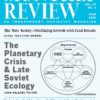Imperialism in the Twenty-First Century
The globalization of production and its shift to low-wage countries is the most significant and dynamic transformation of the neoliberal era. Its fundamental driving force is what some economists call “global labor arbitrage”: the efforts by firms in Europe, North America, and Japan to cut costs and boost profits by replacing higher-waged domestic labor with cheaper foreign labor, achieved either through emigration of production (“outsourcing,” as used here) or through immigration of workers. Reduction in tariffs and removal of barriers to capital flows have spurred the migration of production to low-wage countries, but militarization of borders and rising xenophobia have had the opposite effect on the migration of workers from these countries—not stopping it altogether, but inhibiting its flow and reinforcing migrants’ vulnerable, second-class status. | more…
Imperialism and Anti-Imperialism in Africa
When international media were broadcasting live video footage of Tunisians gathering in hundreds of thousands in front of the central office in Tunis of the long-terrifying ministry of home security, chanting in one voice “the people want to bring down the regime,” something had already changed: ordinary people realized they could make huge changes. Weeks later, the Egyptian uprising removed the Mubarak regime that had been entrenched in power for over thirty years…. The neoliberal forms of imperial rule that had destroyed the hopes of the liberation movements were under attack. In order to counter the possibilities for a massive breakthrough at the popular level, the Western forces mounted an invasion of Libya using the mantra of humanitarianism to disrupt, militarily, political and economic life in Africa. Later in collusion with the counter-revolutionary forces in the Egyptian military, Western imperialism sought to roll back the gains of people in the streets of Tunis and Cairo. | more…
Imperialism’s Health Component
Medicine and public health have played important roles in imperialism. With the emergence of the United States as an imperial power in the early twentieth century, interlinkages between imperialism, public health, and health institutions were forged through several key mediating institutions. Philanthropic organizations sought to use public health initiatives to address several challenges faced by expanding capitalist enterprises: labor productivity, safety for investors and managers, and the costs of care. From modest origins, international financial institutions and trade agreements eventually morphed into a massive structure of trade rules that have exerted profound effects on public health and health services worldwide. International health organizations have collaborated with corporate interests to protect commerce and trade. In this article we clarify the connections among these mediating institutions and imperialism. | more…
Resisting the Imperial Order and Building an Alternative Future in Medicine and Public Health
Although medicine and public health have played important roles in the growth and maintenance of the capitalist system, conditions during the twenty-first century have changed to such an extent that a vision of a world without an imperial order has become part of an imaginable future. Throughout the world, diverse struggles against the logic of capital and privatization illustrate the challenges of popular mobilization. In addition to these struggles, groups in several countries have moved to create alternative models of public health and health services. These efforts—especially in Latin America—have moved beyond the historical patterns fostered by capitalism and imperialism…. All the struggles that we describe remain in a process of dialectic change and have continued to transform toward more favorable or less favorable conditions. However, the accounts show a common resistance to the logic of capital and a common goal of public health systems grounded in solidarity, not profitability. | more…
The New Stage of Globalization
By the end of 1990, foreign direct investment—that is, investment in manufacturing, real estate, raw materials, extraction, financial institutions, etc., made by capitalists of all lands outside their national borders—reached over $1.5 trillion…. [W]hat is significant about this number is not only its size but the unprecedented speed with which it has grown in the last two decades: the amount directly invested in foreign lands nearly tripled in the 1980s alone…. This upsurge and diversification of globalization has been introducing new economic and political features in the countries of both the periphery and the core. In the periphery, foreign capital has penetrated more widely and deeply than ever before. In the core, this change of direction has helped produce in the world’s key money markets an extraordinary spiraling of credit creation, international flows of money capital, and speculation. | more…
The Creation of the Next Imperialism
Insofar as imperialism is about the struggle over and capture of economic territory (which must be broadly defined to include not just geographical territory such as land and natural resources, but also the creation of new markets, sources of labor, and forms of surplus transfer such as are reflected in intellectual property), these changes [in imperialism since the early 20th century] have created distant demands upon imperialist structures and processes…. [So] how can capital (which is increasingly global in orientation) generate the superstructures through which the transfers of value are ensured and the investment risks are moderated and contained? It will be argued that there has been an endeavor to resolve this by refashioning the global institutional architecture in ways that operate to increase the conditions of “stability” for large capital while increasing its bargaining power vis-à-vis working people and citizens, as well as nation-states and even smaller capitalist enterprises. | more…

June 2015 (Volume 67, Number 2)
In two Monthly Review special issues, “Education Under Fire: The U.S. Corporate Attack on Students, Teachers, and Schools” (July-August 2011) and “Public School Teachers Fighting Back” (June 2013), we sounded an alarm regarding the rapid restructuring and privatization of U.S. K–12 public schools. In terms of the scale of nationwide restructuring, the corporate takeover of education is unprecedented in modern U.S. history. The closest comparison we can come up with is the destruction of the street car systems across the United States and the building of the interstate highway system—in which freeways went right through cities for the first time, often in the face of neighborhood and community resistance. With respect to K–12 education, unimaginable amounts of private funds have gone into pressuring and corrupting government at every level, while the control mechanisms of the new educational system are increasingly left in private, not public, hands. The Common Core Standards and related high-stakes tests are at the center of this new system, and are the product of private corporate groups outside the direct reach of government. | more…
Late Soviet Ecology and the Planetary Crisis
Soviet ecology presents us with an extraordinary set of historical ironies. On the one hand, the USSR in the 1930s and ’40s violently purged many of its leading ecological thinkers and seriously degraded its environment in the quest for rapid industrial expansion. The end result has often been described as a kind of “ecocide,” symbolized by the Chernobyl nuclear accident, the assault on Lake Baikal, and the drying up of the Aral Sea, as well as extremely high levels of air and water pollution. On the other hand, the Soviet Union developed some of the world’s most dialectical contributions to ecology, revolutionizing science in fields such as climatology, while also introducing pioneering forms of conservation. Aside from its famous zapovedniki, or nature reserves for scientific research, it sought to preserve and even to expand its forests. | more…
South Africa: Exploding with Rage, Imploding with Self-Doubt—but Exuding Socialist Potential
The fast-reviving South African left is urgently coming to grips with the most acute national crises of structure and agency the country has experienced since the historic freeing of Nelson Mandela in February 1990 and the shift of the entire body politic in favor of the African National Congress (ANC) and the South African Communist Party (SACP).… The subsequent rise in unemployment, inequality, poverty, and environmental degradation soon reached some of the worst levels in the contemporary world. The consequent social unrest is now so high that President Jacob Zuma…promised increased “public order policing” personnel and the purchase of a new generation of technologically advanced weapons, including sonar canons…. In this conflagration, what survived of the left is now growing by leaps and bounds. Within a decade, it may become a force capable of an electoral challenge to the ANC for state power. But much will depend upon how it regroups amidst shards of splintered radical projects, with myriad questions hotly debated in the movement. | more…
The “New Turkey”: Fetishizing Growth with Fatal Results
Turkey’s ruling party has turned the country, which it calls “the new Turkey,” into a capitalist nightmare: a triad of neoliberal economics, political despotism, and Islamist conservatism. This article provides an overview of neoliberalism in Turkey, then looks at the government’s extraction policies, highlighting the Soma mine massacre as one tragic example of the destructive policies of the governing party, the Adalet ve Kalkınma Partisi (AKP, Justice and Development Party). It also examines the extreme authoritarianism of President Recep Tayyip Erdoğan (formerly prime minister), and the growing cultural-relgious conservatism, which the AKP has interlaced with Islamist rhetoric. This hegemonic triad of neoliberalism, despotism, and conservatism is an especially dangerous one. However, it is being increasingly criticized, and resistance movements against neoliberal policies are growing. All of this gives some hope for Turkey’s future. | more…
Boycott, Divestment, and Sanctions at Ten Years
When in March 2012, Barack Obama paused briefly from approving orders for drone killings of Pakistani and Yemeni villagers, in order to reassure the attendees at the annual gala of the AIPAC (American-Israel Public Affairs Committee) that, “when there are efforts to boycott or divest from Israel, we will stand against them,” the real target of his declaration was elsewhere: the myriad grassroots organizers across the world who have made the global Boycott, Divestment, and Sanctions (BDS) campaigns unignorable. Their mounting influence has provoked efforts to declare them anti-Semitic or illegal from London to Long Beach. In fact, the series of victories across the University of California system has so annoyed its managers that they have hauled in the Caesar of domestic repression, Janet Napolitano, to deal with campus activists. Obama’s declaration of support for Israeli colonialism had a simple message to those many activists: back down, because Washington will not. | more…

May 2015 (Volume 67, Number 1)
As we write these notes in March 2015, the Pentagon’s official Vietnam War Commemoration, conducted in cooperation with the U.S. media, is highlighting the fiftieth anniversary of the beginning of the U.S. ground war in Vietnam, marked by the arrival of two Marine battalions in De Nang on March 8, 1965. This date, however, was far from constituting the beginning of the war. The first American to die of military causes in Vietnam, killed in 1945, was a member of the Office of Strategic Services (a precursor of the CIA). U.S. intelligence officers were there in support of the French war to recolonize Vietnam, following the end of the Japanese occupation in the Second World War and Vietnam’s declaration of national independence as the Democratic Republic of Vietnam. The French recolonization effort is sometimes called the First Indochina War in order to distinguish it from the Second Indochina War, initiated by the United States. In reality, it was all one war against the Viet Minh (Vietnamese Independence League). By the time that the Vietnamese defeated the French at Dien Bien Phu in 1954, the United States was paying for 80–90 percent of the cost of the war. | more…

Honor the Vietnamese, Not Those Who Killed Them
In a letter to Vietnam War veteran Charles McDuff, Major General Franklin Davis, Jr. said, “The United States Army has never condoned wanton killing or disregard for human life.” McDuff had written a letter to President Richard Nixon in January 1971, telling him that he had witnessed U.S. soldiers abusing and killing Vietnamese civilians and informing him that many My Lais had taken place during the war. He pleaded with Nixon to bring the killing to an end. The White House sent the letter to the general, and this was his reply.… McDuff’s letter and Davis’s response are quoted in Nick Turse’s Kill Anything That Moves: The Real American War in Vietnam, the most recent book to demonstrate beyond doubt that the general’s words were a lie.… In what follows, I use Turse’s work, along with several other books, articles, and films, as scaffolds from which to construct an analysis of how the war was conducted, what its consequences have been for the Vietnamese, how the nature of the war generated ferocious opposition to it (not least by a brave core of U.S. soldiers), how the war’s history has been whitewashed, and why it is important to both know what happened in Vietnam and why we should not forget it. | more…